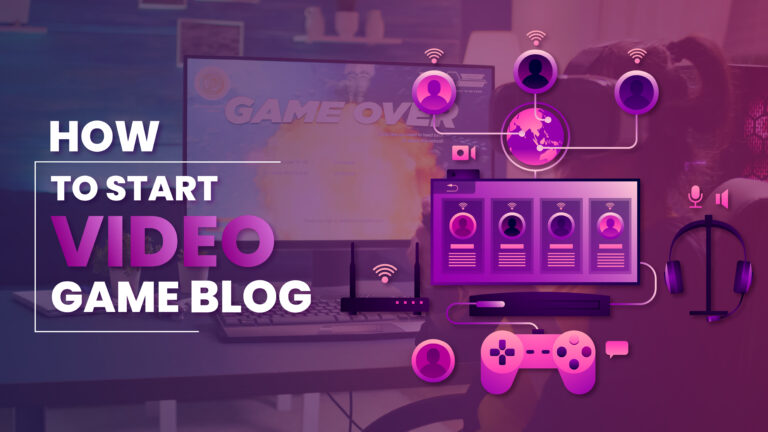In 2026, starting a video game blog 2026 is an exciting way for gamers, writers, and gaming fans to share their passion. With new games, VR experiences, cloud gaming, and esports growing every day, there are more opportunities than ever to reach an audience who loves gaming. To make your blog successful, you need to pick a clear niche, create fun and helpful content, use SEO to get noticed, and connect with other gamers online. Whether you want to write game reviews, share tips and tricks, or cover the latest news, a video game blog can be a fun way to share your love for gaming and even earn some income
How to Start a Video Game Blog (9 Easy Steps)
Gaming in 2026 is bigger than ever. With VR, cloud gaming, mobile esports, and AI-driven game tools, players constantly seek guides, reviews, tips, and news. A video game blog lets you share your expertise, build a community, and even earn money. Here’s a step-by-step guide to launching a successful blog.
Step 1: Pick Your Gaming Niche
The first step is defining your blog’s niche. In 2026, general “gaming blogs” struggle because the industry is too broad. Choosing a specific focus makes your content memorable and easier to rank in search engines.
How to pick your niche:
- By Genre: Focus on RPGs, FPS games, indie games, strategy games, or simulation titles.
- By Platform: PC, PS5, Xbox, Nintendo Switch, mobile, or VR/AR.
- By Content Type: Game reviews, walkthroughs, tutorials, news, esports, or hardware guides.
- By Trend: Cloud gaming, AI-assisted gameplay, or competitive mobile esports.
Tip: Start with one niche and expand later. For example, begin with “indie RPG walkthroughs” before branching into “RPG news and tips.”
Step 2: Understand Your Audience
Knowing your readers is critical to creating engaging content. You need to answer: Who will read your blog, and why?
Steps to understand your audience:
- Identify demographics: Age, region, skill level, and gaming platforms. Example: 18–30-year-old PC gamers who follow strategy games.
- Observe competitors: Look at top gaming blogs to see what works in article length, tone, and content type.
- Engage on social platforms: Join Discord servers, Reddit communities, and Twitter discussions. These are goldmines for questions and trending topics.
- Track search trends: Use Google Trends or other SEO tools to find high-interest gaming topics.
Pro tip: Ask your early readers directly using polls or comments. This builds trust and shows you care about their preferences.
Step 3: Choose a Platform and Domain Name
Your platform and domain name are your blog’s foundation.
Platform Options in 2026:
- WordPress: Best for full control, SEO, and plugins. Ideal for serious bloggers.
- Ghost: Clean and fast, perfect for newsletter-first blogs.
- Substack: Newsletter-focused, good for audience building.
Domain Name Tips:
- Keep it short, memorable, and relevant (e.g., “NextLevelGamers.com”).
- Include keywords if possible (like “gaming,” “guides,” “reviews”).
- Match your domain to social media handles for brand consistency.
Hosting Tips:
- Use reliable providers like Bluehost, SiteGround, or Cloudways for fast loading and uptime.
- Choose a plan that supports media-heavy content like screenshots, videos, and GIFs.
Step 4: Design a User-Friendly Layout
In 2026, a fast, intuitive layout is critical for engagement. Readers expect mobile-friendly and visually appealing designs.
Key elements:
- Responsive Design: Your blog must look great on phones, tablets, and VR screens.
- Intuitive Navigation: Categories like Reviews, News, Tutorials, Hardware, and Esports help readers find content easily.
- Calls-to-Action (CTAs): “Subscribe,” “Comment Below,” or “Watch Video” increase engagement.
- Visuals: Screenshots, gameplay clips, GIFs, and infographics make posts more interactive.
- Social Sharing: Add buttons so readers can easily share content on Twitter, Reddit, or Discord.
Pro tip: Include a sticky navigation bar and highlight popular posts for new visitors.
Step 5: Create High-Quality Content
Content is the backbone of your blog. It must be informative, engaging, and original.
Types of content to include:
- Game Reviews: Share honest opinions, gameplay experience, and pros/cons.
- Tutorials & Guides: Step-by-step instructions for achievements, levels, or complex strategies.
- News & Updates: Release news, patch notes, and gaming trends.
- Esports Coverage: Tournament highlights, player profiles, and team updates.
- Hardware & Gear Reviews: Especially useful for PC and VR gamers.
Tips for quality content:
- Use short paragraphs, bullet points, and visuals to improve readability.
- Include personal insights that readers connect with unique perspectives.
- Update older posts with new information to maintain relevance.
Step 6: Optimize Your Blog for SEO
Even the best content needs search engine visibility. Focus on user-focused SEO to drive organic traffic.
SEO Essentials:
- Target Keywords: Use low-competition, high-volume phrases like “best VR games 2026” or “how to level up fast in [game].”
- Headings & Subheadings: Break content into sections with descriptive H2/H3s.
- Internal Linking: Link to related guides and articles to keep readers engaged.
- Alt Text for Images: Helps Google understand visuals and improves accessibility.
- Meta Descriptions: Short, descriptive summaries to attract clicks from search results.
Pro tip: Use a clickable table of contents to enhance user experience and reduce bounce rates.
Step 7: Build a Community Around Your Blog
A strong community keeps readers coming back and sharing your content.
Ways to build engagement:
- Respond to comments promptly and encourage discussions.
- Create a Discord server or forum for readers to share ideas.
- Run polls, surveys, or challenges related to games.
- Host live Q&A sessions or gameplay streams.
- Collaborate with other gaming bloggers for cross-promotion.
Pro tip: Readers are more likely to subscribe and share content if they feel part of a community.
Step 8: Promote Your Blog on Social Media and Forums
Promotion is essential to get your content noticed.
Effective promotion strategies in 2026:
- Share posts on Twitter, Instagram, TikTok, YouTube Shorts, and gaming groups.
- Join Reddit subreddits, Steam forums, and Discord communities.
- Host giveaways or contests to encourage sharing.
- Engage in discussions on Quora or niche gaming forums.
- Repurpose content as short videos, threads, or infographics for social platforms.
Pro tip: Focus on platforms where your target audience spends most of their time, quality over quantity.
Step 9: Monetize Your Video Game Blog
Once you have readers, you can start earning. Monetization options in 2026 include:
- Affiliate Marketing: Recommend games, consoles, and accessories through affiliate links.
- Sponsored Content: Partner with game developers or tech brands for reviews or promotions.
- Ad Networks: Google AdSense, gaming-specific ad networks, or direct ad placements.
- Memberships & Subscriptions: Offer exclusive content, ad-free experiences, or early access to guides.
- Merchandise: Sell branded products like t-shirts, mugs, or digital guides.
Pro tip: Always disclose partnerships or affiliate links to maintain credibility and trust.
Conclusion
In 2026, building a thriving video game blog in 2026 is more than just sharing gameplay or reviews — it’s about connecting with a passionate community, offering unique insights, and staying ahead of gaming trends. By consistently creating high-quality content, optimizing for search engines, and interacting with readers, your blog can become a go-to resource for gamers worldwide. With opportunities like affiliate marketing, sponsored posts, and exclusive memberships, your passion for gaming can also turn into a sustainable income. Dedication, creativity, and authentic engagement are the keys to transforming a simple blog into a powerful platform that informs, entertains, and inspires the gaming community.
Frequently Asked Questions (FAQs)
How can I earn money from a video game blog in 2026?
You can monetize through affiliate partnerships with gaming platforms and accessories, sponsored posts from developers, ad placements like Google AdSense, membership subscriptions, and selling gaming-related merchandise or digital guides
Which blogging platform is best for a video game blog?
WordPress remains the most flexible platform due to its SEO capabilities, plugins, and customizable design. Ghost or Substack can also work for newsletter-focused or minimalistic setups
How frequently should I publish content on my gaming blog?
For growth and engagement, aim to post at least 2-4 times per week, balancing news updates, reviews, tutorials, and long-form guides
Do I need to be a professional gamer to run a blog successfully?
No, but deep knowledge of your niche or genre helps create content that readers find trustworthy and valuable
What type of content performs best on a gaming blog?
In-depth game reviews, tutorials, walkthroughs, industry news, esports coverage, and hardware or accessory reviews attract the most engagement
How do I drive traffic to my video game blog?
Share content on social media platforms like Twitter, Instagram, TikTok, and Discord, participate in gaming communities, optimize your posts for SEO, and use email newsletters to reach your audience directly
Can I include video content on my gaming blog?
Yes, embedding gameplay clips, tutorials, or live streams increases engagement, boosts time spent on your site, and enhances your SEO performance
Are there tools to help me manage and grow a gaming blog?
SEO tools, keyword planners, analytics dashboards, and content scheduling tools help track performance, optimize posts, and maintain consistency
How do I build a loyal community around my blog?
Encourage comments, host polls or discussions, create a Discord server or forum, and engage regularly with readers through live streams or Q&A sessions
Is it possible to start a gaming blog with a small audience?
Yes, focusing on high-quality content, engaging with niche communities, and promoting your blog on social channels allows even small blogs to grow steadily


No Comments
I have been reading out a few of your articles and i can claim nice stuff. I will surely bookmark your site.
Your comment is awaiting moderation.